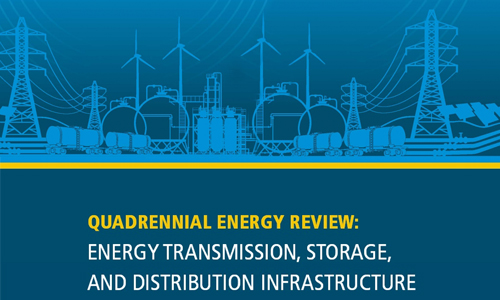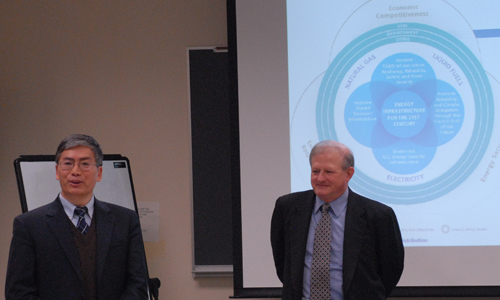
Senior Adviser to the Secretary of the U.S. Department of Energy William F. Hederman spoke at one of the most well attended Energy Exchange seminars this semester, despite the University being closed for snow. The event, held on March 4, was part of a seminar series aimed at outreach and education for relevant energy topics. Hederman spoke about goals and challenges for energy infrastructure in the United States.
 The seminar concentrated on the first-ever Quadrennial Energy Review, featuring assessments and recommendations for the future, which was authorized following a Presidential Memorandum. The QER will focus on energy transmission, storage and distribution. Hederman said the QER is an important step in working toward economic competitiveness, environmental responsibility, and energy security. Creating a path to a lower carbon future through integration of renewable energy and lessoning dependence on other nations are points he noted as important in achieving these goals.
The seminar concentrated on the first-ever Quadrennial Energy Review, featuring assessments and recommendations for the future, which was authorized following a Presidential Memorandum. The QER will focus on energy transmission, storage and distribution. Hederman said the QER is an important step in working toward economic competitiveness, environmental responsibility, and energy security. Creating a path to a lower carbon future through integration of renewable energy and lessoning dependence on other nations are points he noted as important in achieving these goals.
Producing energy innovations that make economic sense, Hederman said, ensures sustainably. “If you think about how we get from here to a better future, we have to be real careful to make sure we don’t kill off the things that create value and create wealth because you need that value and wealth to create the investment path,” Hederman said.
Whether it be through loans, government money or equity investment, Hederman said, getting the cost down through research is vital and the United States has managed to do that in a few ways. He cited applying the pay as you go techniques from the cell phone industry to the photovoltaic rooftop business as one example.
“Part of why Europe is in so much trouble is that they started over-investing in stuff that didn’t make economic sense,” Hederman said. “So now they have a system where they are using renewable resources that are too costly for them to stay competitive.”
Hederman said an alarming finding of the QER is growing outside threats, including extreme weather events and cyber threats. One of the major takeaways of the review is that everything in the industry is changing in dramatic ways right now.
Hederman is an electrical engineer and public policy analyst with experience in both the public and private sectors. He received engineering degrees from the Massachusetts Institute of Technology and the University of Notre Dame and a master’s degree in public policy from the University of California at Berkeley.

